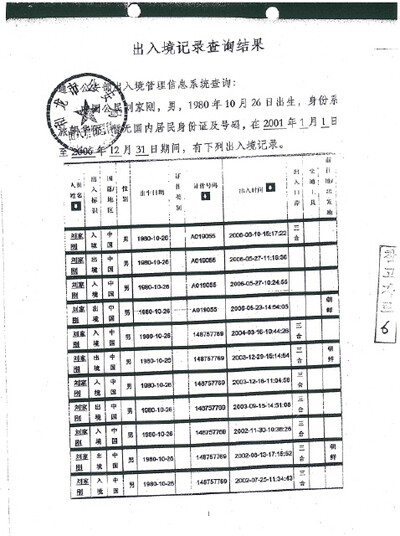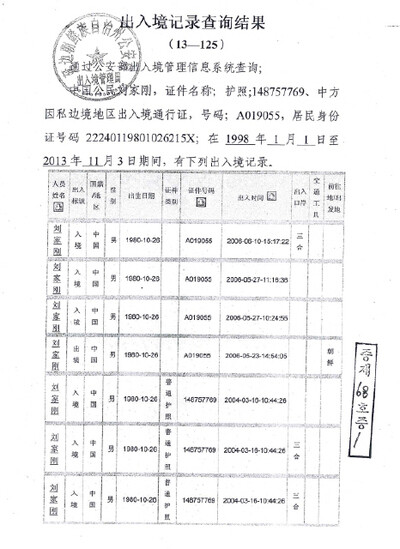hankyoreh
Links to other country sites 다른 나라 사이트 링크
Chinese government says Korean officials forged immigration documents

By Kim Jeong-pil and Lee Kyung-mi, staff reporters
In the appeal of Yoo Woo-sung, 34, the Chinese government officially stated that the public Chinese documents that South Korean prosecutors submitted as evidence during the trial, including immigration records of Yoo’s trips between North Korea and China, had been forged. Yoo is a North Korean refugee of Chinese ethnicity who worked as a public servant for the city of Seoul until he was arrested on charges of espionage. China also created a stir when it announced that it intends to investigate the charges that Chinese government documents had been fabricated. This could result in criminal charges being brought against the National Intelligence Service and the prosecutors, who investigated the case and indicted Yoo.

In a statement to the press released on Feb. 14, MINBYUN-Lawyers for a Democratic Society said, “It was confirmed that the results of an inquiry into Yoo’s border crossing records, the document explaining the border crossing record, and the reply that the public security bureau in Helong sent to the Korean consulate in Shenyang - which the prosecutors submitted to the court as evidence - were all forged.” MINBYUN also released to the public the response from the Chinese consulate in Korea to its factual inquiry.
Previously, Hon. Yun Seong-won, the judge in the seventh criminal division of the Seoul High Court who is presiding over the appeal, asked the Chinese consulate to review the authenticity of the documents submitted by the prosecutors.
The prosecutors submitted these documents to the court in the appeals trial in Nov. and Dec. 2013, claiming that they had been issued by the public security bureau in Helong, China. The point of debate in the case was whether Yoo had continued to visit North Korea after his mother’s funeral was held on May 27, 2006. The prosecutors claimed that the records were evidence showing that Yoo had left North Korea in June as well.
In contrast, Yoo’s attorney offered another Chinese government document - immigration records provided by the public security bureau in Yanbian Korean Autonomous Prefecture - and argued that these showed no record of Yoo entering North Korea after May 27. The court sent a factual inquiry to the Chinese consulate, asking it to determine which of the immigration records was correct.
In its response, the Chinese consulate said that all of the documents submitted by Yoo’s attorney were factual and legal official documents. On the other hand, the consulate said, the three documents that the prosecutor submitted were all fabricated.
“The fabricated government documents submitted by the Korean prosecutors lead to criminal allegations that the official document and stamp of Chinese government organizations was forged,” the Chinese consulate wrote in its response. “China will investigate this in accordance with the law. We intend to find the people responsible for this crime, and we ask the relevant authorities to cooperate by providing the consulate with information about where the forged documents came from.”
The Yoo case was investigated by the National Intelligence Service and then handed over to the prosecutors. In the initial trial, Yoo was acquitted of the charge of espionage. A source with the prosecutors said that they would prepare their position and make an announcement soon.
Please direct questions or comments to [english@hani.co.kr]

Editorial・opinion
![[Column] Park Geun-hye déjà vu in Yoon Suk-yeol [Column] Park Geun-hye déjà vu in Yoon Suk-yeol](https://flexible.img.hani.co.kr/flexible/normal/500/300/imgdb/original/2024/0424/651713945113788.jpg) [Column] Park Geun-hye déjà vu in Yoon Suk-yeol
[Column] Park Geun-hye déjà vu in Yoon Suk-yeol![[Editorial] New weight of N. Korea’s nuclear threats makes dialogue all the more urgent [Editorial] New weight of N. Korea’s nuclear threats makes dialogue all the more urgent](https://flexible.img.hani.co.kr/flexible/normal/500/300/imgdb/original/2024/0424/7317139454662664.jpg) [Editorial] New weight of N. Korea’s nuclear threats makes dialogue all the more urgent
[Editorial] New weight of N. Korea’s nuclear threats makes dialogue all the more urgent- [Guest essay] The real reason Korea’s new right wants to dub Rhee a founding father
- [Column] ‘Choson’: Is it time we start referring to N. Korea in its own terms?
- [Editorial] Japan’s rewriting of history with Korea has gone too far
- [Column] The president’s questionable capacity for dialogue
- [Column] Are chaebol firms just pizza pies for families to divvy up as they please?
- [Column] Has Korea, too, crossed the Rubicon on China?
- [Correspondent’s column] In Japan’s alliance with US, echoes of its past alliances with UK
- [Editorial] Does Yoon think the Korean public is wrong?
Most viewed articles
- 1[Column] Park Geun-hye déjà vu in Yoon Suk-yeol
- 2Why Korea shouldn’t welcome Japan’s newly beefed up defense cooperation with US
- 3[Guest essay] The real reason Korea’s new right wants to dub Rhee a founding father
- 4Will NewJeans end up collateral damage in internal feud at K-pop juggernaut Hybe?
- 5Thursday to mark start of resignations by senior doctors amid standoff with government
- 6N. Korean hackers breached 10 defense contractors in South for months, police say
- 7[Column] ‘Choson’: Is it time we start referring to N. Korea in its own terms?
- 8Kim Jong-un expressed ‘satisfaction’ with nuclear counterstrike drill directed at South
- 9[Editorial] New weight of N. Korea’s nuclear threats makes dialogue all the more urgent
- 10Senior doctors cut hours, prepare to resign as government refuses to scrap medical reform plan